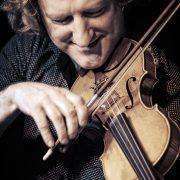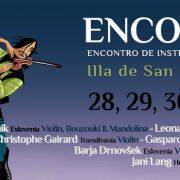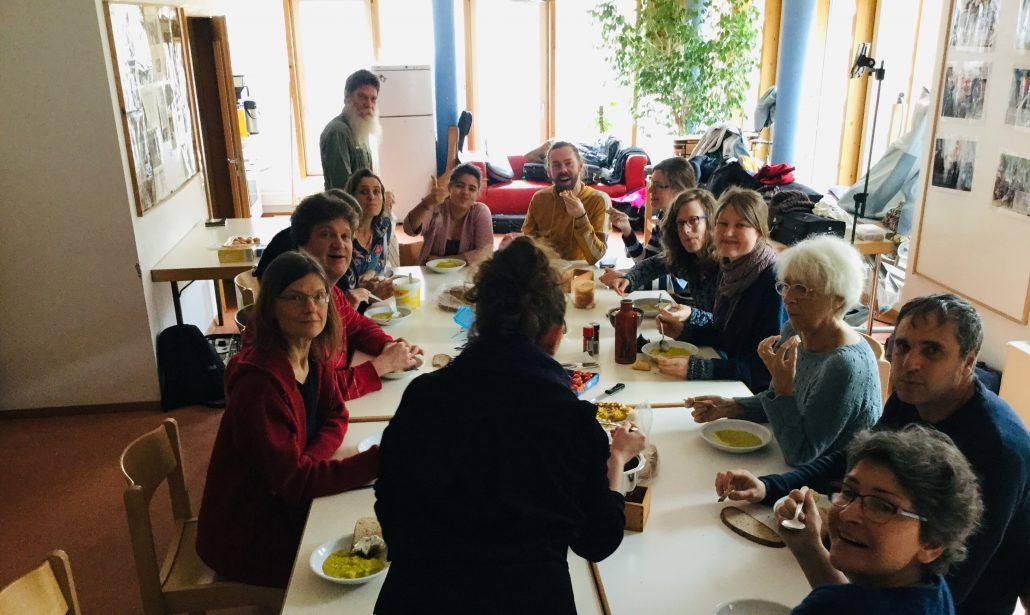When? Every Thursday from 5 p. m. to 6.30 p. m. (except during school holidays)
Where? Tower Pungert, Kranj
What? Music workshop for all young and old string players and other instrumentalists.
Godalkanje means gathering of young musicians who play ethno tunes without notes. The emphasis is on playing by ear and including improvisation. The workshops help children and adults understand playing in front of a mass audience and in a group with exalted adult musicians. Godalkanje workshops have been held at various national music schools in Slovenia for several years.
Mentor: Barja Drnovšek / Bojan Cvetrežnik and other visiting mentors
Price: 20 € / month (4 workshops)
When? From October 29, 2019 to November 3, 2019
Where? Ljubljana
More information: godalkanje@gmail.com
Visual design: https://www.brandician.eu/
A double set of workshops on the theme of dance music of Central Europe (especially France and Belgium) will take place in Ljubljana during the autumn holidays. This time, the guest mentor will be Wouter Vandenabeele from Belgium, who will prepare a large concert-dance programme for the final concert in the Festival Hall together with Barja Drnovšek. The concert will take place on November 3 at 6 p.m. Wouter is the founder of the group Ola Vogala and the festival ‘Fiddlers on the move’, where ‘Slovenian Fiddle Gang’ has already got a lot of admiration. He is a teacher, composer and multi-genre violinist, most recently playing a lot of African music with the band Tamala.
The workshops are suitable for anyone who masters the instrument at the 5th grade level; more advanced Godalkanje students will get their challenges. Balfolk music is mostly diatonic, the melodies are ingeniously beautiful, some dance steps can be learned simultaneously. Let us mention some dance forms typical of Balfolk – mazurka, scottish, andro, hanter dro, chapelloise, bourrée, circle circassian, gavotte de l’aven, waltz, … A group of students and teachers from Sweden will join us at the workshops and concert. In addition to violins, they also play the Swedish folk instrument – the nyckelharp. It is also possible to participate in a common musical act of children from different music schools who already know the songs or will learn them themselves and come to one joint rehearsal, on Saturday, October 26th.
Price:
Before the 1st of October: 140 €
Before the start of the workshops: 190 €
Regular students of Godalkanje in 2019/20: 60 €
Passive participation: 20 € / day
Schedule:
TUESDAY, October 29, from 4 p. m. to 7 p. m. (workshop)
WEDNESDAY, October 30, from 11 a. m. to 2 p. m. and from 4 p. m. to 7 p. m. (workshop)
THURSDAY, October 31, from 11 a. m. to 2 p. m. and from 4 p. m. to 7 p. m. (workshop)
FRIDAY, November 1, from 3 p. m. to 6 p. m. (workshop)
SATURDAY, November 2, from 11 a. m. to 2 p. m. and from 4 p. m. to 10 p. m. (recording and a concert, Tower Škrlovec in Kranj)
SUNDAY, November 3 (dress rehearsal and the concert, Festivalna dvorana, Ljubljana)
The schedule is approximate in nature and may slightly change depending on the circumstances.
When? March 6th and 7th, 2019
Where? De Centrale, Gent (Belgium)
Mentor: Bojan Cvetrežnik
When? June 28 – 30, 2019
Where? San Simon, Galicia (Spain)
What? Bojan and Barja will be mentors at the “Encordass” adult workshops organized by Galicia Fiddle. This year’s theme is Eastern European music.
You can see some snapshots here.
When? June 30 – July 7, 2019
Where? San Simon, Galicia (Spain)
What? We are very pleased that our Spanish colleagues have recognized our work and invited us to take part in international workshops on a small island on the west coast of Spain as part of the Erasmus + project. Slovenian Fiddle Gang with youngsters will take part in workshops with various mentors from several European countries, and Bojan and Barja will also be mentors for Eastern European music. There are also some concerts waiting for us within the camp. We hope for more such exchanges!
You can see some snapshots here.

When? Once a week 60 – 90 minuts (except during school holidays). The exact date will be known after the applications are received – presumably on Wednesday afternoons. Where? Trnovo, Ljubljana Mentors: Bojan Cvetrežnik, Barja Drnovšek, visiting mentors of Godalkanje For whom? For all the string players and all players of rhythm section (bass, guitar, ukulele, accordion …)
The workshops are expected to take place on two levels of difficulty and are suitable for all ages:
Namuznjeno Godalkanje: for all of you who master the repertoire for the 3rd grade of lower music school.
Hobi Godalkanje: for all of you who master the repertoire for the 5th grade of lower music school.
What? At the Godalkanje group workshops, we teach content that is not yet widely available in our country. We draw mainly from the treasury of violin tunes of different nations. We learn by listening, following chords, performing different techniques (‘chops’, jig, swing, different ornamentation …). We refresh the learned repertoire at street performances and in concert halls. More information and applications: godalkanje@gmail.com
Where? Music school Laško Radeče, Valvazorjev trg 2, Laško
Required level of prior knowledge: sovereign performance of the repertoire for the 2nd grade of lower music school.
For the sixth year in a row, immediately after the end of the school year, Godalkanje will take place in Laško as part of the Romanica Antiqua festival. The mentors will be Bojan Cvetrežnik and Barja Drnovšek. In the case of registered participants with different backgrounds, we will make two groups. We will introduce children to attractive tunes with the desire to strengthen technical stability, a sense of pulse, self-confidence in performance and the joy of playing. We will learn the technique of performing accompaniments by following a written chordal guide typical of jazz music. We will also pay attention to the safe physiological posture of children. We hope that the nice weather will allow us to play also in the nearby park or on the streets. If you have concerns or fears, you can contact us or those who had fear in previous years but no longer know it.
Registration fee: 150 €
We are happy that care for minors will be this year organized again. The organizer offers a favorable opportunity for a stay at the Laško Health Resort.
When? From February 28 to March 4, 2019
Where? Werkstadthaus, Aixerstrasse 72, Tübingen (Germany)
What? Violin technique workshops
At the invitation of Kathryn Doehner (German violinist, founder of the folk camp “Ethno Germany” and the folk project “Folklang”), we conducted five day workshops of violin technique for local violinists at the end of February. The emphasis this time was on the production of a beautiful tone (contact points, bow posture), changing strings, motoric functions of the fingers of the left hand (independent horizontal, ventricular and lateral movement of the finger), natural posture and independence of the body pulse from performance movements.
When? 12th and 13th of April 2019
You can read more about the programme of visiting weekend workshops here:



















